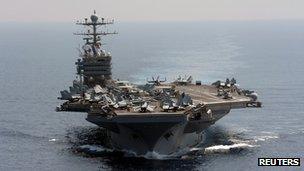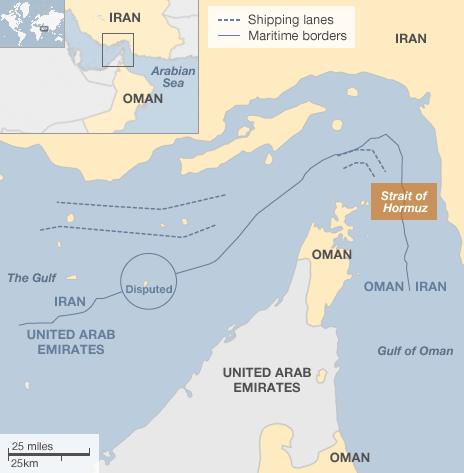Will Iran hardliners strike back at Western pressure?
- Published
- comments

USS Abraham Lincoln is headed to the Strait of Hormuz
The crisis over Iran's nuclear ambitions is inflamed again with Western nations pursuing a strategy designed to bring the issue to a head during the coming year.
The European Union has agreed a boycott of Iranian oil, and the US Navy has sent a carrier group back into the Gulf in defiance of Iranian threats.
As so often during the last decade, the name of the game is pressure, and the strategy is designed to give the US president who emerges from November's elections a clearer choice about whether or not to take military action.
The problem with this thinking, as at times in the past, is that it assumes the Iranians will march to the Western tune and timetable.
The EU's oil move, coupled with a similar policy by the US, is designed to ratchet up the pressure on Mahmoud Ahmadinejad's government. It faces numerous economic difficulties already, and a significant drop in the revenue it receives from oil is intended to exacerbate these difficulties.
Reassurance for US allies
Military steps meanwhile are designed to show the Iranians that their recent promises of military action if US Navy vessels patrolled the Strait of Hormuz are nothing but hollow threats.
Sending the aircraft carrier USS Abraham Lincoln, with British and French escorts, through this critical waterway is meant as a gesture of reassurance also to American allies such as Saudi Arabia or Kuwait whose oil exports must pass through it.
If measures to limit Iran's oil exports or demonstrate American power in the Gulf do not bring greater pliability on the nuclear dossier, then the question of possible military action will be high in the new or re-elected president's in-tray, say people familiar with the Western strategy.
President Barack Obama's Republican opponents have already been trying to paint him as a wimp on Iran and promising they would take tougher action.
Desire for crisis?
The key problem with these moves or rhetoric is the difficulty of predicting how they will play with decision makers in Tehran. One school of analysis already argues that Mr Ahmadinejad is now a moderate, relatively speaking, who is being sidelined by more hard line figures around the Supreme Leader Ayatollah Ali Khamenei.
In mapping the world view of these often Messianic believers, the traditional tools used to calculate Washington's foreign policy are of limited use.
Would they actually like a limited military confrontation with the West? Would a certain amount of rioting or an atmosphere of crisis on the streets of Tehran be helpful to them in resisting further democratisation? Is the best way to offset an EU oil embargo to create a crisis that forces up the price gained from sales elsewhere?
Previous Iranian behaviour - for example during the hostage crisis that helped prevent President Jimmy Carter's re-election - is that some of the clerical hardliners like the idea of calling the shots during a US presidential year.
Under these circumstances, any number of provocations is open to the Revolutionary Guard and others who might reap advantage from crisis.
Western, perhaps even US, sailors might be seized for some alleged infringement of Iranian waters, as happened to the British in 2007. Iranian proxies, for example in Lebanon might seek to trigger some confrontation too.
Unilateral action
Perhaps the ultimate gesture of defiance might be the sudden announcement of a nuclear test. This would bring to a head contradictions among Western nations, some of whom already believe that the world needs to get used to the idea of a nuclear Iran.
Adding to the air of uncertainty are regional fears of a unilateral Israeli strike or of anti-Iranian Gulf states pursuing their own nuclear ambitions.
The Israeli defence minister has recently tried to downplay fears of an imminent attack, but his prime minister prefers to maintain a more ambiguous position. A key Saudi Arabian insider meanwhile has repeated suggestions that the declaration of an Iranian nuclear capability would prompt his country to develop its own.
For the moment, the Iranian government has reacted to the new steps against it with an emollient line, arguing that it is ready to co-operate fully with forthcoming inspections by the International Atomic Energy Authority.
But the Gulf is entering a period of high tension, and it would be foolish to think that all of the regional actors will necessarily keep their powder dry until after the US presidential elections.
